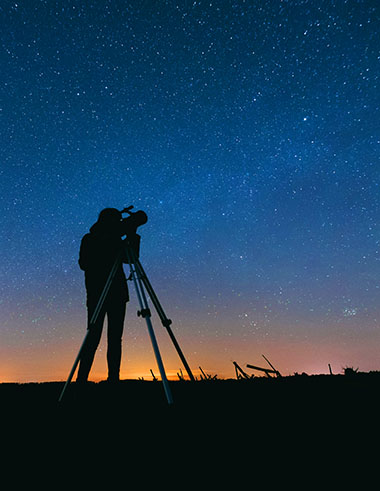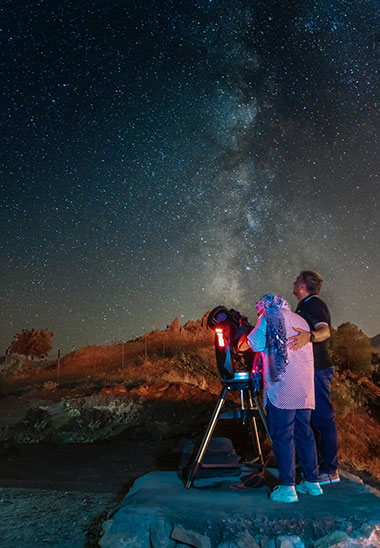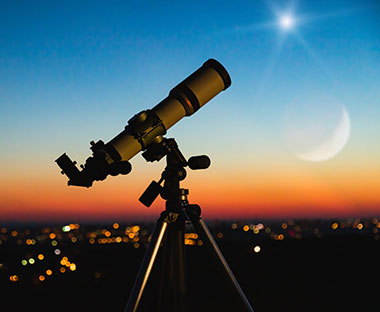Recreation > StargazingStargazing & AstronomyDiscover the Cosmos: StargazingPicture this: a serene night sky, stars twinkling like scattered diamonds, and a sense of wonderment that transcends age. Stargazing, often seen as an activity reserved for the young and curious, is an undeniably rewarding hobby that transcends time. Simply looking up at the night sky and appreciating the beauty of the stars, planets, and constellations is a popular and accessible pastime enjoyed by people of all ages. It's a great way to connect with nature, spark curiosity about the universe, and relax after a long day. Celestial Wonders AwaitHave you ever gazed up at the night sky and felt a surge of awe? That vast expanse, the shimmering stars, and the countless mysteries waiting to be uncovered—it's an experience that beckons exploration. Beyond a fleeting moment of appreciation, stargazing offers a fulfilling journey, promising relaxation, mental stimulation, and an avenue for social connection. Why Consider Stargazing? Stress Reduction and Mental Stimulation Social Connection and Physical Activity Rediscovering Wonder What Awaits Through the LensWith a telescope that gathers enough light and has high resolution, you can witness the breathtaking beauty of deep sky objects like galaxies, nebulae, and star clusters in stunning detail. One of the best options for both beginners and experienced observers, is the very popular Celestron - NexStar 8SE Telescope. It has an 8-inch aperture that allows you to see a wide variety of celestial objects, and it is easy to assemble and break down. The go-to mount with a database of over 40,000 celestial objects makes it easy to find and track objects in the night sky. Witness the intricate details of planets like Jupiter and Saturn, explore galaxies like the Milky Way and Andromeda, delve into the captivating beauty of nebulae, and discover clusters of stars that form mesmerizing patterns across the night sky. Choosing the Perfect Telescope for StargazingSelecting a telescope can be overwhelming, but fret not! Here's a breakdown of key factors to consider: Light Gathering Power (Aperture): Bigger is generally better. A larger aperture (diameter of the main lens or mirror) captures more light, revealing fainter celestial objects and intricate details. For astronomy enthusiasts, a 4-6 inch (100-150 mm) aperture is a good starting point. Telescope features: Reflectors (Mirrors): Newtonian and Dobsonian telescopes offer the most aperture for your budget, making them ideal for deep-sky objects like nebulae and galaxies. Refractors (Lenses): Renowned for exceptional clarity, refractor lens telescopes are perfect for viewing planets and the Moon, but larger apertures come at a steeper price tag. Schmidt-Cassegrains: These high end telescopes combine mirrors and lenses into a compact design, providing good aperture in a portable format, suitable for both planetary and deep-sky observing. Mount Stability: Equatorial Mounts: Ideal for serious observation, Equatorial Mount telescopes track the night sky's movement as the Earth rotates, keeping objects in view. Dobsonian Mounts: Simple and affordable, Dobsonian Mount telescopes offer excellent stability for their price, making them a popular choice for beginners. Go-To Mounts: Computerized Go-to Mount telescopes automatically locate and track celestial bodies, but they can be more complex and expensive. Portability: If you plan on venturing out for observing sessions, consider the telescope's size and weight. Larger telescopes offer superior light grasp but can be cumbersome to transport. For grab-and-go observing, telescopes in the 3-5 inch range are more manageable. Eyepieces: Remember, the best telescope is the one that best suits your interests and observing style. By considering these factors, you'll be well-equipped to choose the perfect telescope to embark on your astronomical journey! Setting Your Stargazing Journey in MotionTips for Aspiring Stargazers:
Getting Started: Your Celestial ToolkitEquip yourself with the essentials. Research telescopes and binoculars, download stargazing apps like Sky Map or Star Walk 2, and find a suitable spot near your home for practice sessions. Delve into the offerings of local astronomy clubs or events to kickstart your stargazing journey. Where to Look and LearnUnveil the universe's mysteries through an array of resources: Online Resources: Sky & Telescope Magazine, Astronomy Magazine, NASA Night Sky Network, Stellarium Web, offer a treasure trove of knowledge. Books: Dive deeper into the cosmos with NightWatch by Terence Dickinson, The Backyard Astronomer's Guide by Terence Dickinson, and Turn Left at Orion by Guy Consolmagno and Dan M. Davis. Let the Journey BeginEmbarking on a stargazing adventure may seem daunting, but remember, every cosmic exploration starts with a single gaze. Attend stargazing parties, participate in workshops, and take it slow—absorb the cosmos at your pace. Invite friends and family to join, turning stargazing into a shared, memorable experience. Stargazing is not just a hobby; it's a gateway to endless fascination. The universe eagerly awaits your gaze. So, step outside, telescope in hand, and lose yourself in the vastness of the night sky. Let the stars be your guide as you embark on an exploration that transcends time and age. Whether it's seeking solace in the tranquility of the cosmos or diving into the vibrant world of astronomy clubs, the celestial realm offers something truly magical for everyone. |
 Photo by Thirdman Photo by Thirdman Photo by Akbar Nemati / Pexels Photo by Akbar Nemati / Pexels Photo by Astrosystem / Adobe Stock Photo by Astrosystem / Adobe Stock |